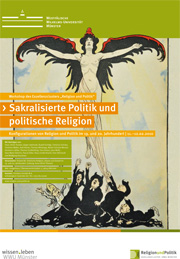Conference: Sacralised Politics and Political Religion
Changing Configurations of Religion and Politics in the 19th and 20th Centuries

Programme Flyer of the Workshop
In its effort to define its own final legitimisations, politics is to a large extent bound to use religiously prefigured political languages. This is the line of argument furthered by the historians who convene a workshop within the Cluster of Excellence “Religion and Politics” in mid-February 2010. Between February 11th and 12th, 2010, eighteen speakers from Germany, Great Britain, and Switzerland discuss the relationship between sacralised politics and political religions within the frame of an academic workshop in Münster. The conference will take place at the Liudgerhaus, Überwasserkirchplatz 3. People interested in attending the workshop are kindly requested to register with the administrative board by February 1st.
The French Revolution and its aftermath are considered as a period of fundamental change. The organizers illustrate in their announcement that “the French Revolution eroded the traditional bonds between religion and power. Yet, it was in need to provide other higher explanations and legitimisations in order to erect and stabilize a new political order.” The conveners of the conference argue that in order to legitimize this new political culture, people were to some extent bound to use and in fact did instrumentalise traditional and Christian prefigured symbols and political languages. These symbols and languages were transformed during the late 18th and 19th centuries and were supplemented by a genuine revolutionary tradition.
The focus of this workshop is to analyse social movements as well as regional, national and transnational spaces of discourse and social interaction from the French Revolution in 1789 to the present times. Examples from Western and Eastern Europe as well as from the United States will draw a picture that follows the brush strokes prefigured by sacral languages, images or practices which have served to mobilize and legitimise political or social aspirations of reform and change. The headings of “sacralised politics” and “political religion” will be used to establish different configurations of their mutual relations and to compare these individual configurations with each other. The speakers will try to make use of a broader definition of religion in order to argue for an understanding of religion as cultural practice which constitutes imagined communities and senses of belonging.
Keynote Speech by Hermann Lübbe
On Thursday, February 11th, the renowned philosopher Hermann Lübbe will give a public keynote lecture. He will enquire into the problems of “religion as cultural and political winner of modernization” (J 119, formerly known as J 122). (Christian Müller)
Programme
Thursday, 11 February
- 9:30–10:00 Hans-Ulrich Thamer (Münster): Begrüßung und Einführung
- 10:00–10:30 Jürgen Gebhardt (Erlangen-Nürnberg): Das religiöse Dispositiv der modernen Politik
- 10:30–11:00 Diskussion
Sektion 1: Sakralisierte Politik, Gemeinschaftsstiftung und Interessenorganisation im 19. Jahrhundert; Moderation: Jens-Ivo Engels
- 11:00 – 11:30 Rudolf Schlögl (Konstanz): Diffusion und Enteignung: Religion in der konstitutionellen Ordnung 11:30–12:00 Diskussion
- 12:00–12:30 Christina Schröer (Münster): Sakralisierte Politik zur Republikanisierung der französischen Nation, 1789–1889
- 12:30 – 13:00 Christian Müller (Münster): Ein Krieg der Wörter. Die Dialektik von politischer Religion und religiöser Politik in transnationalen Kongressbewegungen, 1855–1870
- 13:00–15:15 Diskussion
- 15:15–15:45 Axel Körner (London): Mazzini und Garibaldi im ehemaligen Kirchenstaat. Die Inszenierung politischer Religion zwischen Mythos und Macht
- 15:45–16:15 Thomas Welskopp (Bielefeld): Anti-Saloon League und „zweiter“ Ku Klux Klan: „Charismatische Verbände“ als politische Mobilisierungsform in den Vereinigten Staaten, 1890–1930 16:15–16:45 Diskussion
- 16:45–17:15 Martin Schulze Wessel (München): Sakralisierung der Politik in der Französischen und der Russischen Revolution (1789/1917)
- 17:15–18:00 Diskussion
- 18:00–20:00 Hermann Lübbe (Zürich), Öffentlicher Abendvortrag, Religion als Modernisierungsgewinner – kulturell und politisch
Friday, 12 February
Sektion 2: Zwischen Demokratie und Diktatur: Die Inszenierung sakraler Bilder des Politischen; Moderation: Heike Bungert
- 9:15–9:45 Thomas Großbölting (Münster): Friedliche Revolution – Wende 1989/90: Inszenierung und Sakralisierung von Politik zwischen Staatsakten und Bürgerrechtsbewegung
- 09:45–10:15 Yves Bizeul (Rostock): Die Funktion sakraler Bilder des Politischen in Propaganda und Medieninszenierung
- 10:15–11:.00 Diskussion
- 11:00–11:30 Jana Weiß (Münster): Martin Luther King Day – „A Non-violent Man is martyred“
- 11:30–12:00 Sara-Marie Demiriz (Münster): Politische Religion im Kemalismus, Atatürk und die Gründung der modernen Türkei, 1923–1938
- 12:00–14:00 Diskussion
Sektion 3: Politische Religion, Gewalt und Konflikt im Zeitalter der Extreme (1918–1968); Moderation: Thomas Großbölting
- 14:00–14:30 Pascal Eitler (Berlin): „Revolution“ oder „Transformation“? Politisierte Religionen zwischen „New Left“ und „New Age“, 1965–1990
- 14:30–15:00 Klaus Große-Kracht (Münster): Öffentliche Inszenierungen des Schulterschlusses von katholischer Kirche und Drittem Reich im Jahr 1933, Bistum Berlin
- 15:00–15:45 Diskussion
- 15:45–16:15 Sven Reichardt (Konstanz): Der Pathos des Menschlichen? Anmerkungen zur Friedensbewegung
- 16:15–16:45 Wolfgang Kraushaar (Hamburg): Religiöse Desozialisation und Sakralisierung des „bewaffneten Kampfes“ – das Beispiel der „Roten Armee Fraktion“
- 16:45–17:30 Abschlussdiskussion

